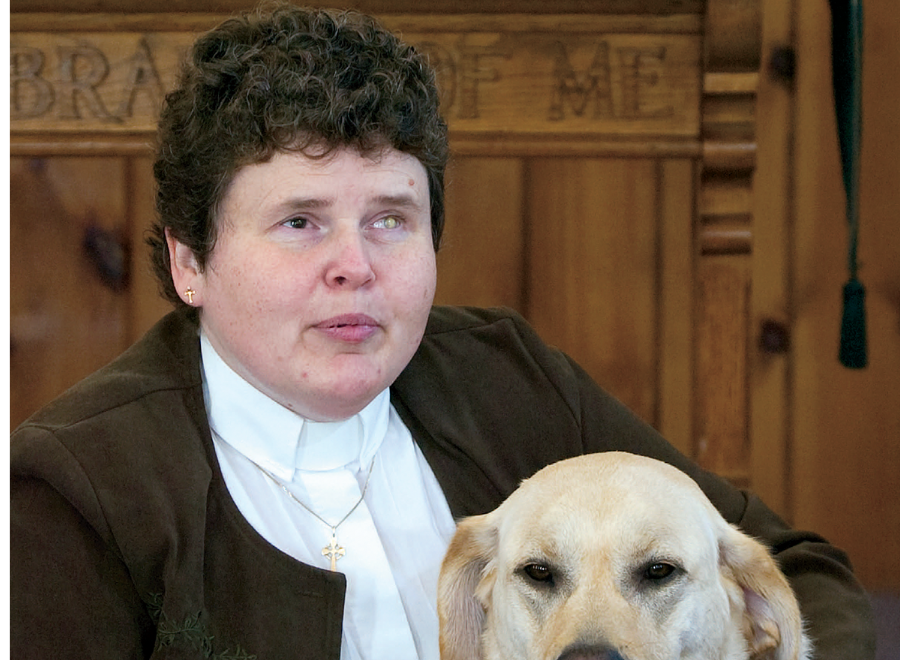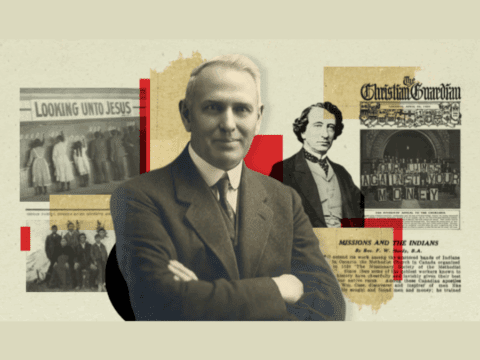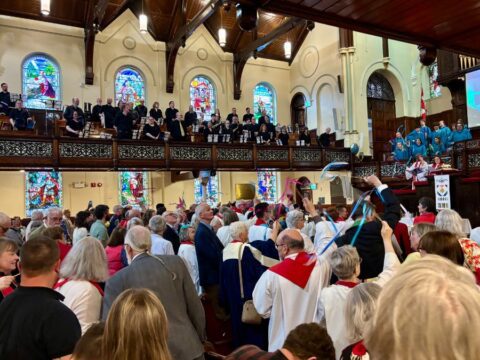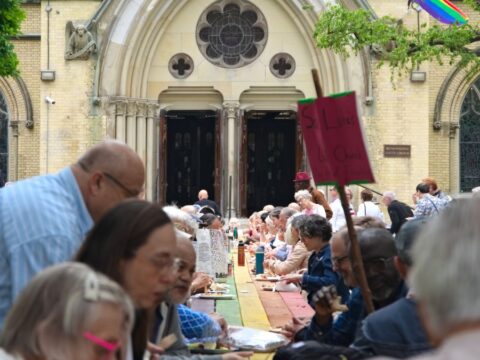Rev. Sharon Ballantyne of Peterborough, Ont., is the United Church’s first blind ordained minister. She talks to Jocelyn Bell about losing her sight, how she reads and why she was once afraid to conduct baptisms.
JOCELYN BELL: You’re a mother of two. You work full-time as a Grade 3 teacher and eight hours a week as a minister at Fairview United. You’re working toward a PhD in theology and you volunteer at Hospice Peterborough. And you’re blind. That’s a lot of stuff. How do you do it?
SHARON BALLANTYNE: [Laughs] It is a lot of stuff. It really comes down to staying very present. It’s about having lots of passion for what you’re doing. You’re into it, and you don’t feel like you’re tired or run down. It just works.
JB: Can you describe a typical day for me?
SB: Sure. Up by about 5:30 to 6 a.m., devotions, get the dog all sorted out, leave for school by about 7:30 a.m., home by five on a good day. Depending on the night, I’ll be down at the hospice, or I’ll be down at the church or doing homework things. And our family has a policy of everybody eating dinner together.
JB: When and how did you become blind?
SB: I was born almost three months premature. I grew up with light perception in my right eye and about five percent vision in my left eye. I was always considered legally blind. I could never read the chalkboard in school, but if I could get a book close enough to my face, it was super clear. I would literally balance the book right off my nose.
It wasn’t until 1995 that I lost all of my vision due to complications following a procedure to remove a cataract. Glaucoma set in. Between ’92 and ’95, I experienced a continual fading and graying of vision. So I went from being able to read newsprint and the telephone book to not being able to read at all.
JB: What’s the most difficult part about being blind?
SB: Not being able to do things as independently as I once did. I haven’t seen anything for 13 years. And I guess somewhere along the line, it was like, okay, are you going to let this get you or are you going to get it? So, at this point in my life, being blind is a nuisance, but it’s not what I would call crippling and it does have its blessings as well.
JB: How do you mean? Can you give an example?
SB: When I go out to do a parish visit, nobody ever worries about how tidy their house is or what they look like. And I guess because my disability is so obvious, it cuts through a lot of judgments. It may be a sensitivity to, “Oh, she doesn’t see, so she’s had to deal with some stuff in her own life obviously.” It’s not like I’ve walked in their shoes or they in mine, but there is some sort of openness that comes.
JB: So people are more able to be vulnerable around you?
SB: I think vulnerable is a very good word for it. You have to have this amazing sense of humour. You have all these experiences in life, and yes, they have their frustrations, and yes, they’re a nuisance, but you’ve got to go through them. I’m full of embarrassing stories!
JB: Would you care to share a few? Anything recent?
SB: Oh, probably not since half an hour ago [laughs]. All kinds of silly things, like when you reach out to shake someone’s hand and you grab them inappropriately, or going into the guy’s bathroom when you think you’re going into the ladies’ room. It’s endless.
JB: When did you start thinking about the ministry?
SB: I’d always wanted to be a teacher. So when I was in first-year university, I majored in psychology and sociology and took some religion courses as electives. Before I even finished first year, I switched my major to religious studies. At the same time, a mentoring minister gave me all kinds of leadership opportunities in the church.
When I finished my undergraduate, he said, “Sharon, why don’t you at least go through and become a deacon?” That was in the Anglican church. I remember thinking, I’m 22 years old. What do I know? So I determined that I could teach and still be active in the church. And that was probably good enough. But, it wasn’t.
JB: Tell me about your call to become a minister.
SB: It started in 1995-96 and was precipitated by a couple of things. First, the death of a student. Then the minister of our United Church died suddenly. She was only 37. The little embers went from a flicker to a burning fire inside that said, “How much time do you think you have to listen to me?”
It was at the most ironic of times because I had lost all my sight. Which made it kind of like, whoa, hey silly, how do you think you’re going to be able to do a whole master’s program? You’ve got no sight and your closest theological institutions are a good two to three hours in either direction. But, it was just to be. I began theological studies at Queen’s University in 1997.
JB: That’s a lot of challenges. How did you read the books?
SB: Most of the time, I’d take the book, scan the text and then read it using the screen reader on my computer. And that’s still how I do my most demanding reading. But some journal readings don’t scan very well. For that, I had a wonderful group of about half a dozen volunteer readers from my home congregation. I would hand them an article and a tape, and ask them to bring it back in a week.
JB: As you worked toward becoming an minister, did anyone doubt your ability to do the job?
SB: Absolutely. My process was very challenging. It was very difficult for people to think outside the box, especially the Education and Students Committee. That group is largely composed of ministers. They knew how they did things, so when they tried to imagine how they would do it without sight, it looked like one big impossibility. But for me, sorting out how I’m going to do a pastoral visit is no different from sorting out how I’m going to go to a doctor’s appointment. Or how different is it to prepare a lesson for the classroom than to prepare a worship service? You use the same strategies.
JB: You seem very positive and practical. But did you have any doubts yourself?
SB: I wondered, how am I going to baptize a baby? This was huge for me. Holding the baby, finding the water and keeping it within a really good flow. This is a sacrament; I didn’t want to be fumbling. One Sunday, at the church where I was doing a placement, we had a couple of children who were being baptized and one of them was being very restless. My supervising minister just asked the parents to hold the baby. And it was like, oh, there it is, right there! It really wasn’t that big of a problem, it was only a problem in my head.
JB: In May 2006, you became the United Church’s first blind ordained minister. How does that feel?
SB: The whole pioneer thing, trailblazer, whatever you want to call it, that’s not what it’s all about. It just happens to be me. I think it’s terribly sad that there weren’t others before me because I have a hard time believing that since the time of church union, no other sight-impaired person has ever experienced a call. I hope that it will be a message to others who are dealing with whatever kind of disability — don’t give up. If you’re really feeling that God is calling you to be a minister, then go with it and don’t let fear get in your way.
***
This story first appeared in The United Church Observer’s October 2008 issue with the title “‘Being blind is a nuisance, but it does have its blessings as well.’”














